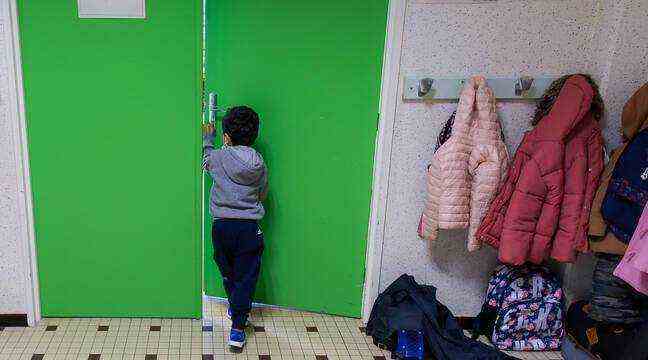“Clearly, January will be tense,” admitted the Minister of Education, Jean-Michel Blanquer, in an interview with Parisian published this Monday referring to the coming weeks at school. In December, the Scientific Council estimated that 30% of teachers could be absent by the end of January, because they will be affected by the coronavirus or because they will have to keep their children at home. According to Pierre Favre, vice-president Syndicat National des Ecoles (SNE), the situation is already tense in certain primary schools in some territories: “like the South-East, the North, the Grand-Est, even if it is not ‘this is not yet a disaster scenario,’ he explains.
But it is especially in secondary schools that teacher absences are starting to be felt. “We already have feedback from the academies of Rennes, Strasbourg and Clermont-Ferrand, which report 10% of absent teachers,” said Sophie Vénétitay, secretary general of Snes-FSU. Laurent Zameczkowski, spokesperson for the Federation of Parents of Public Education Students, also notes that “the academies of Créteil and Versailles are affected by numerous teacher absences which have been aggravated by the health crisis”.
A long-standing problem, but aggravated by the health crisis
A concern for the National Education, which is already struggling to manage the absences of teachers during periods outside Covid-19. In December, a report from the Court of Auditors thus advanced the figure of 2.5 million hours of lessons lost in secondary education due to short absences not replaced over the year 2018-2019. On
the Ouyapacours platform of the FCPE, parents of students (including non-members) can report the absence of a teacher who has not been replaced. Since September 2021, 24,861 hours lost have been recorded. The problem is more significant in secondary school where certain disciplines, which are already having difficulty recruiting, are in need of replacements, “such as math, technology and modern languages”, observes Sophie Vénétitay. And the TZRs (full teachers in the replacement area), whose mission is to replace absent teachers, have all been assigned since the start of the school year.
Anticipating disorganization due to the surge in Omicron cases, the education ministry has devised a strategy. First of all, the new protocol in place since Monday provides that teachers with contact cases, if they are vaccinated, will be able to take lessons after having taken a negative test. To curb the spread of the virus in the teachers’ room, coffees will now have to be consumed sitting down. Parent-teacher meetings should be held at a distance. To limit absences, the ministry has also suspended departures in continuing education for the next few months. And he wants to recruit more contract workers. “This makes it possible, in the first degree, to go from a replacement capacity of 9% (out of the total number of school teachers) to 12-15% depending on the academies”, affirms Jean-Michel Blanquer in The Parisian.
Retirees, called to come back to work
Campaigns to recruit contract workers are already organized throughout the year by the academies. “But they are not enough because in the second degree, last November, some students did not have lessons in certain disciplines for lack of teachers,” said Sophie Vénétitay. Laurent Zameczkowski also believes that recourse to contract workers is not always optimal: “In the first degree, the required condition is to hold a diploma of bac +3 level, and in the second degree a bac +4. Many find themselves facing students without having received any pedagogical training ”.
To expand its pool of replacements, the ministry is relying in particular on former teachers: “We have voluntary temporary workers who retired one, two or three years ago, maybe a little more. We are obviously talking about several hundred per academy ”, has indicated Jean-Michel Blanquer Monday on
LCI. An idea approved by Pierre Favre: “I think there will be candidates, because it is an opportunity for them to have additional income and to make a civic gesture”. Sophie Vénétitay is much more dubious: “I find it hard to believe that retirees will return en masse to establishments, even though some are more vulnerable to the coronavirus. It looks a lot like an ad effect. “
“College and high school students risk having Gruyère schedules”
Another way for the ministry to boost the pool of replacements: to appeal to students “who did not pass their competition but have teaching skills,” says Jean-Michel Blanquer. The famous students on complementary lists. “They will be called momentarily, as since last April”, said the minister on LCI.
But will there be enough candidates? Sophie Vénétitay is quite pessimistic and is already anticipating the consequences of fewer lessons for the students: “The second term will be upset. It is not possible to prepare the bac under its conditions. We are already asking that the final specialty exams, scheduled for March, be postponed to June ”. Same feeling with Laurent Zameczkowski: “The college and high school students may have schedules in Gruyère during the second quarter. And the more the children accumulate behind in the programs, the more this will handicap their school career, ”he warns.

